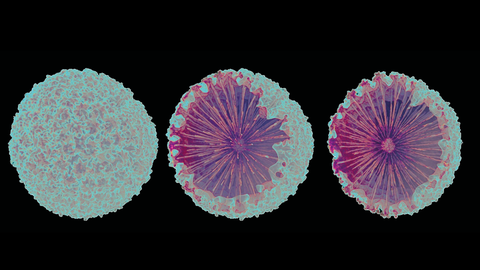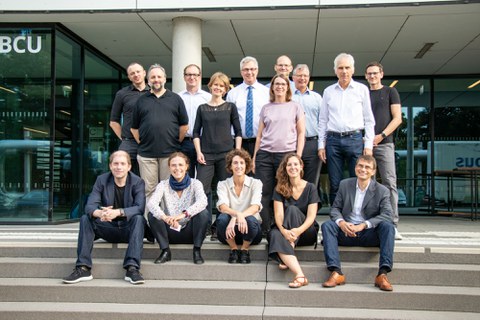Nov 27, 2025
Millions for research into sustainable materials: DFG funds new Research Training Group at TUD

Materials created by nature: skeletal glass element from the sponge Geodia cydonium imaged using x-ray nano-tomography. Total diameter is 10 micrometer.
The German Research Foundation (DFG) is establishing the new Research Training Group, “The Biological Making of Materials” (RTG 3142) at TUD Dresden University of Technology. To this end, the DFG is providing several million euros for a period of five years. Up to 20 PhD students will work on this interdisciplinary research project, deciphering the mechanisms by which organisms produce functional materials and regulate their properties both spatially and temporally. Their findings concerning materials created by nature will enable innovative approaches to the production of sustainable materials in the future. The interdisciplinary RTG brings together researchers from various fields and is headed by Speaker Prof. Yael Politi (B CUBE – Center for Molecular Bioengineering, TUD) and co-speaker Prof. Franziska Knopf (CRTD – Center for Regenerative Therapies Dresden & the Faculty of Medicine, TUD).
Collaborative and interdisciplinary research

Participating principal investigators of the RTG „The Biological Making of Materials”
Prof. Angela Rösen-Wolff, Vice-Rector Research and Technology Transfer at TUD said, “This newly established Research Training Group is an excellent example of how collaborative and interdisciplinary research is carried out at TUD in the interest of cutting-edge science. In addition, by linking life sciences and materials science, the research topic offers numerous points of contact with our Clusters of Excellence and also addresses important issues of societal responsibility to which TUD is fully committed, such as sustainability and transfer aspects.”
Organisms produce a wide array of versatile materials. They build these materials primarily from simple building blocks such as sugars, proteins, and minerals. These biological materials are produced in aqueous environments at ambient pressure and temperature, and can therefore serve as prototypes for the sustainable design and manufacture of bio-inspired materials.
Connecting life sciences with materials science
Advancing sustainable materials production requires scientists and entrepreneurs who can operate in interdisciplinary contexts and connect life sciences with materials science. This new generation of "material biologists" will identify and decipher biological solutions to challenges in material synthesis that can be translated into future innovations and sustainable material technology. The goal of the DFG-funded RTG will be to gain a mechanistic understanding of materials formed by organisms across multiple scales.
“In this way, our Research Training Group represents a qualification program that is specifically designed to bridge the gaps between the life sciences and materials science by offering fundamental training in both areas. All of us involved— including our colleagues at the Center for Molecular and Cellular Bioengineering (CMCB), and the Faculties of Biology, Physics, Medicine, Mathematics, and Computer Science at TU Dresden—are thrilled to be able to explore this fascinating topic together," agree Prof. Politi and Prof. Knopf.
Formation of biological materials
RTG 3142 will focus specifically on the formation of biological materials such as cuticular proteins in spiders and flies, biogenic crystals in zebrafish, and the silica dioxide cell walls of diatoms. Mathematical modeling, biochemical, biophysical, and molecular biological approaches will be used to decipher the formation of a variety of biological materials. Fifteen principal investigators, including biologists, chemists, physicists, materials scientists, and mathematicians, will work together on this interdisciplinary research and training program for five years. The results will provide insights into both general and unique solutions for material requirements found in nature and ultimately advance the development of bio-inspired sustainable material processing techniques.
Contact:
Prof. Dr. Yael Politi
Speaker Research Training Group RTG 3142
B CUBE – Center for Molecular Bioengineering
+49 351 463-44301
Prof. Dr. Franziska Knopf
Co-speaker Research Training Group RTG 3142
CRTD – Center for Regenerative Therapies Dresden
